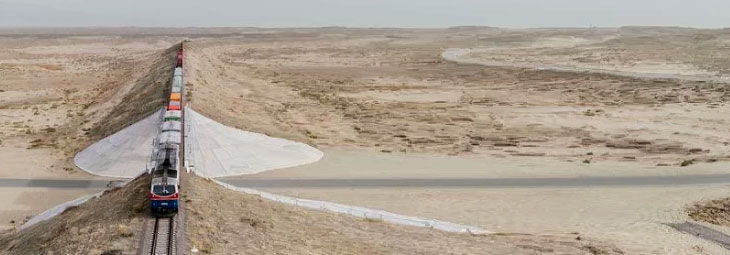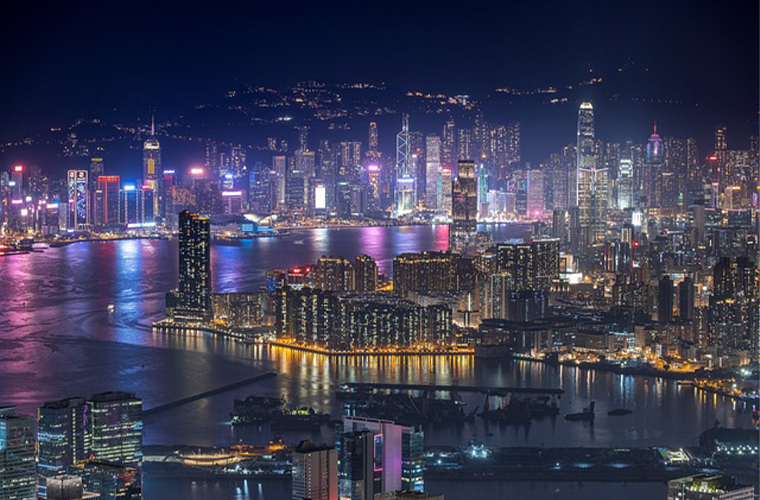



This year marks the 10th anniversary of the Belt and Road Initiative (BRI), a fruitful initiative that has increasingly become a widely influential and inclusive platform for international economic cooperation, injecting new momentum into global development. BRI represents a new opportunity for the development of China and the world, and also provides a broader scope for Hong Kong's development.
Hong Kong's Participation in BRI Has Achieved Fruitful Results
Hong Kong has actively responded to the BRI and endeavored to serve the needs of the country with its own strengths, becoming an active participant, contributor and beneficiary of the construction of the "Belt and Road".
1. Hong Kong has organized eight consecutive sessions of the Belt and Road Summit since 2016. the first seven sessions holding more than 3,800 project matching meetings and attracting more than 33,000 participants. The 8th Belt and Road Summit Forum, which was just concluded recently, attracted the participation of nearly 6 000 government officials, professionals and business leaders from nearly 70 countries and regions, as well as more than 100 delegations. The forum exceeded the scale of the previous sessions, and once again highlighted the status of the forum as an important platform for trade and investment among Mainland, Hong Kong and overseas enterprises. In addition, Hong Kong has actively participated in the first and second sessions of the Belt and Road Summit on International Cooperation to tell the China and Hong Kong stories of the Belt and Road to the international community.
2. Leveraging the advantages of an international shipping center to help connect facilities in the co-established countries. Hong Kong has signed civil aviation transportation agreements with a number of co-established countries to jointly weave the "Air Silk Road" network. China Merchants Group owns 66 ports in 26 countries and regions around the world, and Kerry Logistics, the largest international third-party logistics service provider based in Hong Kong, has offices in 59 countries and regions around the world, spreading across the "Belt and Road" countries and regions. At present, flights departing from Hong Kong can reach more than 200 destinations around the world, and cargo ships departing from Hong Kong can reach nearly 600 destinations around the world. Hong Kong is increasingly becoming an important bridge and hub connecting the countries under joint construction.
3. Giving full play to the advantages of an international trade center and help build a smooth flow of trade for the commonwealth. Over the past decade, Hong Kong has actively expanded its overseas economic and trade network, adding three new economic and trade offices in Jakarta, Bangkok and Dubai, and signing Free Trade Agreements (FTAs) with 13 economies, Agreements for the Promotion and Protection of Investments (APIPs) with 17 economies, and Comprehensive Agreements for the Avoidance of Double Taxation (CAPDTs) with 21 economies, which have provided strong support to trade and investment co-operation with co-established countries. Hong Kong has also given full play to its unique advantages in providing legal and arbitration services for trade cooperation in the "Belt and Road", and has continued to build an international legal and dispute resolution service center in the Asia-Pacific region to facilitate the development of trade in the co-established countries.
4. Leveraging the advantages of an international financial center to facilitate the financing of the co-built countries. With the world's largest offshore RMB capital pool and offshore RMB bond market, and handling 3/4 of the world's offshore RMB payment business, Hong Kong can better meet the needs of the co-establishment countries in using RMB for cross-border trade settlement and for investment and financing in RMB through the continuous introduction of offshore RMB investment products and channels, as well as a number of cross-border connectivity mechanisms. The Hong Kong Monetary Authority established the Infrastructure Financing Facilitation Office (IFFO) in 2016 to establish a platform for key stakeholders to cooperate and join hands in large-scale infrastructure investment and financing projects. Hong Kong has fully utilized its strengths in the securities market and attracted about 80 enterprises from ASEAN countries to list in Hong Kong. In addition, Hong Kong has successfully issued Islamic bonds on three separate occasions to demonstrate to the outside world the diversity and viability of Hong Kong's bond market.
5. Utilizing the advantages of the intermingling of Chinese and Western cultures, and to help the people of the co-constructed countries to communicate with each other. The HKSAR Government has taken the lead in promoting humanistic exchanges by optimizing visa policies to facilitate people-to-people exchanges between the co-constructing countries, and setting up Belt and Road Scholarships to attract students from the co-constructing countries to come to study in Hong Kong. The rescue team of the HKSAR Government successfully completed its overseas rescue mission in the severe earthquake disaster in Turkey in 2023, which was widely praised by local people and the international community. Hong Kong's civil society has also been actively involved in the "Belt and Road" work of people-to-people exchanges. The Sharing Foundation has provided medical humanitarian assistance to Cambodia, Laos, Djibouti and other countries, completing more than 3,000 cataract surgeries over the past five years. The Health Express Hong Kong Foundation has launched the BRI Sight Walk Program, which will help nearly 2,000 cataract patients to regain their sight from 2016 to 2019.
Hong Kong's participation in the construction of BRI is energized.
A decade of spring and fall has brought us a new era of prosperity. As the high-quality development of the "Belt and Road" enters a new journey, Hong Kong's unique advantages are becoming more prominent, and will certainly add majestic momentum to the construction of the "Belt and Road" and Hong Kong's own development.
1. The "One Country, Two Systems" system has unique advantages. "One Country, Two Systems" is the best institutional arrangement for Hong Kong to maintain long-term prosperity and stability, and it is also a unique institutional advantage for Hong Kong's in-depth participation in the construction of "Belt and Road". With the dual advantages of "one country" and "two systems", Hong Kong is in a better position to help Chinese enterprises to "go out and invite in", and to promote the development of Hong Kong and Mainland enterprises. Hong Kong enterprises and mainland enterprises will be encouraged to "go out to sea together" and jointly develop the international market. Hong Kong's better fulfillment of its role as a "super-contact person" will further assist the country in building a new development pattern of "double-circle", and create an important international hub for the pragmatic cooperation of the "Belt and Road".
2. Outstanding advantages in professional services. Hong Kong is at the key node of the "Belt and Road", with mature and developed industries such as shipping, accounting, finance and consulting, as well as the unique advantages of Hong Kong's Common Law system in foreign economic and trade cooperation, which are highly compatible with the core elements of the "Belt and Road", such as the connectivity of facilities, smooth trade and financial integration. These are highly compatible with the core elements of the "Belt and Road" construction, such as the connectivity of facilities, smooth flow of trade, and financial integration. Hong Kong's further development of the "Belt and Road" investment, financing, trade and shipping hub, and the Asia-Pacific Regional Center for International Legal and Dispute Resolution Services will provide strong "software" support for the high-quality development of the "Belt and Road" support.
3. The advantages of cultural convergence are boundless. As a place where East meets West, Hong Kong has the advantage of an eclectic mix of cultures. Hong Kong has close ties with the countries along the Belt and Road, especially Southeast Asian countries, as well as a wide range of external ties among Hong Kong's higher education institutions, media, civic organizations, and film and television industries. Hong Kong's further development as an international cultural and arts exchange center will deepen humanistic exchanges with the co-construction countries, promote cultural integration and people-to-people exchanges, and provide a broader stage for telling China's story and Hong Kong's story to the outside world.
Looking ahead, the future looks bright
The brilliant achievements in the construction of the "Belt and Road" over the past 10 years have fully demonstrated that the co-construction of the "Belt and Road" is in line with the development needs of the world and meets the expectations of the international community. As Hong Kong enters a new phase of transition from chaos to governance and from governance to prosperity, Hong Kong's participation in and contribution to the construction of the "Belt and Road" is now presented with a new historical opportunity. With the full support of the Central Authorities and the concerted efforts of the HKSAR Government and various sectors of the community, Hong Kong will definitely be able to capitalize on the advantages of the "One Country, Two Systems" system, better play its unique role of "backing up the motherland and connecting with the world", continue to expand its international exchanges and co-operation, and contribute to the development of the "Belt and Road" in the future. The construction of the "Belt and Road" will shine even brighter.
People's Daily (September 18, 2023, 10th Edition)
Author: Jiang Yichu
Source: <http://www.scio.gov.cn/gxzl/ydyl_26587/zxtj_26590/zxtj_26591/202309/t20230918_769793.html>
Edited and Translated by Chen Xiao